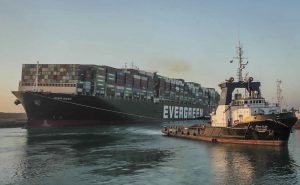 – Naadiya Adams
– Naadiya Adams
The Ever Given ship, that blocked the Suez Canal for a week will sail again on July 7th. A six-day blockage in the Suez Canal earlier this year that caused chaos for the maritime community has finally been resolved and the financial dispute settled according to the Suez Canal Authority. On March 23rd hundreds of boats and ships waited in place as the Japanese-owned, now infamous, Ever Given ship, one of the largest container ships in the world, became lodged across the canal blocking all traffic through the waterway.
The ship, its cargo, and its crew have since been held as a legal dispute ensued between the Suez Canal Authority and Shoei Kisen Kaisha Ltd., the owner of Ever Given (Evergreen line) – they are all set to be released in a ceremony in the Suez Canal city of Ismailia on Wednesday.
“Further to the arrest of M.V. Ever Given in Egypt and negotiations between the shipowner and the Suez Canal Authority (SCA), Evergreen Line is pleased to confirm the acknowledgement from the shipowner that an agreement in principle has been reached in respect of the SCA’s claims, and a final formal settlement agreement is currently under negotiation,” said Ever Given in a statement last week.
The vessel’s grounding has been the topic of discussion for months since the incident, with both sides laying blame on the opposing party, bad weather, poor decisions on the part of canal authorities, human and technical errors were all factors believed to have contributed to the blockage.
The SCA had demanded $916 million in compensation to cover costs due to salvage efforts, reputational damage and lost revenue but it was later lowered to $550 million.
Shoei Kisen and the ship’s insurance company had disputed the claim as well as the ship’s detention under an Egyptian court order.
In an interview with Radio Islam, Christian Bueger, Director of SafeSeas Maritime Security Research Network says the cause of the incident has not been determined and that presents a range of problems.
“We don’t really know what caused the accident, there are several theories around it but us not really knowing what caused the accident in the end will make it difficult for us to know how to prevent a future accident,” said Bueger.
Bueger says there are several theories as to what may have caused the blockage, it could have been largely due to the storm; the ship should never have entered the canal in those weather conditions.
“That would be to blame it on the pilots who were navigating the ship through the canal. Another theory blames it on the captain but I think that is hugely problematic because a lot of the time in shipping accidents there’s a lot of blame on the sea fairer,” explains Bueger.
Bueger says it’s also important to note that with the Covid19 pandemic, ships are getting bigger, containers are getting bigger and that may present challenges in the future which he believes may call for restrictions on how much the ships be allowed to carry.
Another aspect he highlights is the number of containers going overboard, at least 2500 containers have already gone overboard this year, and the contents of the container may cause dangers for sea life and further pollution.
“Just to give you another example, the ship that recently caught fire off Sri-Lanka is now polluting beautiful beaches because of the containers on board and there’s a lot of plastic pieces that were transported in these containers and they are now destroying the nature of Sri-Lanka.”
Bueger says the Evergreen accident shed light on what is happening on our seas, and as a public we need to be more aware of what is going on.







0 Comments